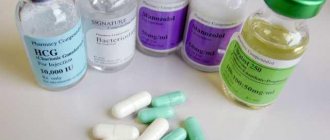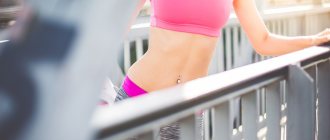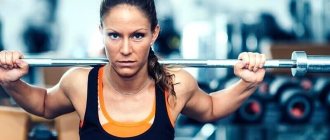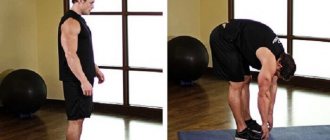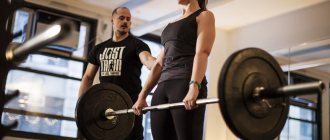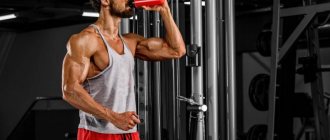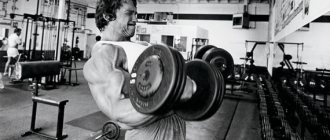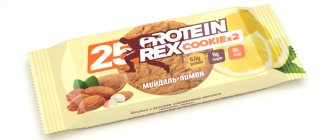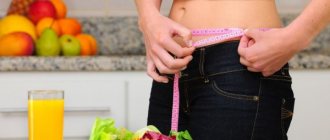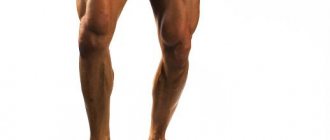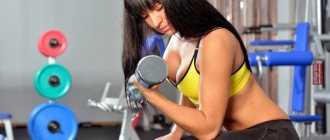Nuances of a sports diet
The main substances responsible for a boost of energy and strength are carbohydrates, fats and proteins.
Basic principles of sports nutrition:
- Carbohydrates maintain blood sugar levels. Complex carbohydrates with a low GI (glycemic index) are recommended. It is necessary to avoid fluffy buns, pies and pastries, as refined sugars are used in their preparation. You can replace them with berry and fruit smoothies, oatmeal, whole grain bread and nuts.
- You can get complex carbohydrates from durum wheat pasta, eating them in the first half of the day so that they break down in the evening.
- Tea, juices and tea cannot replace water, so you need to drink at least 2 liters of water per day. Carbonated drinks are prohibited due to their high content of hidden sugars.
- Proteins prevent muscle breakdown and activate fiber restoration, simultaneously reducing the percentage of fatty tissue. It is these substances that provide a feeling of long-term satiety.
- Proteins supply the body with amino acids, which take part in the construction of muscles.
- To obtain proteins, you can eat lean, skinless poultry, seafood, dairy and fermented milk products with reduced fat content.
- A protein breakfast is prepared from low-fat cottage cheese with the addition of a carbohydrate-rich banana; omelet of 2 eggs with boiled chicken or vegetables; a slice of whole grain bread with fish and a salad of fresh vegetables.
- Fats consist of fatty acids necessary to stabilize metabolism. To obtain fat from the body, vegetable oil is added to salads in an amount of no more than 2 tbsp. l. per day.
- Consistency in the quantity and timing of food intake is important. You should eat 4-5 times a day.
Don't miss the most popular article in the section: Laser hair removal on the face and body - how it is done, effectiveness, before and after photos, contraindications.
Pre-workout fats
Do they play any role? There is a popular belief that eating fat slows down the consumption of carbohydrates and thereby increases the overall energy of the body. But here's the experimental data: One study found that increasing dietary fat intake 24 hours before physical activity (in this case cycling) reduced performance compared to a high-carbohydrate diet.
Another study found that even slowing carbohydrate utilization did not improve overall performance and energy. Deakin University concluded: “Although fat intake reduces the rate of carbohydrate utilization, it does not have a positive effect on performance.” Therefore, you can take some fat before your workout, but don't expect anything special from it.
When can you eat before and after training?
According to the recommendations of nutritionists, the optimal time to eat before starting a workout is 1.5-2 hours. A serving of food should consist of easily digestible proteins and slow carbohydrates, but contain a reduced amount of fat. If due to lack of time it is not possible to plan a full meal before training, you cannot refuse a snack.
A serving of cottage cheese with honey or a glass of fresh kefir with whole grain bread an hour before the start of classes will help out. If dizziness and weakness were noted during sports training, the next time you need to eat a small amount of fast carbohydrates before starting work in the gym: a ripe banana, an orange, an apple.
For burning fat and losing weight
What to eat before training, if its goal is aimed at burning fat, interests mostly girls. It is recommended to pay attention to the consumption of protein foods, which ensure the building of muscles and slow carbohydrates, which provide long-term satiety and a surge of vitality.
1.5 hours before fat burning training you can eat:
- steamed chicken breast with a slice of rye loaf and boiled rice - only 150 g;
- steamed veal steak with a couple of boiled potatoes;
- omelette of 3 egg whites with steamed oatmeal;
- steamed fish steak with 200 g of boiled asparagus;
- serving 200 g of cottage cheese with 1 tbsp. l. natural honey;
- fruit salad of apple, citrus and berries.
You should refuse to eat for 1 hour so that the body, by inertia, continues to burn its own fat reserves.
For gaining muscle mass
You should not eat foods indiscriminately before training. Food should be energy efficient and slowly digestible. To gain muscle mass, protein is essential, the amino acid composition of which contributes to high-quality and safe muscle building. At the same time, carbohydrates are also needed, which provide the athlete with energy.
List of products for muscle gain:
- beef tenderloin, poultry, lean pork;
- beans, dried fruits and any types of nuts;
- eggs in the form of omelettes or hard-boiled;
- whole grain breads and cereals;
- fish of all kinds and fresh seafood.
After sports, 15 minutes later you can eat a smoothie or an apple, drink kefir. It is better to eat dinner 1 hour after class.
Before strength training
Food should be taken no later than 2 hours before classes, as intense physical activity slows down digestion. A full stomach when performing approaches causes nausea and decreased activity.
Carbohydrates are needed for energy, and proteins, with the help of amino acids, provide anabolic “support” to working muscles. It is better to exclude fats, as they slow down the absorption of nutrients and take longer to digest.
Products that are best used before strength training:
- poultry with bran bread, rice or whole grain pasta;
- lean fish fillet or meat with baked potatoes;
- oatmeal porridge with omelette;
- cottage cheese with cornbread.
The volume of food should not be large so that you do not feel heaviness in the stomach later.
Before training when “drying”
In order for intensive drying training to be as productive as possible, you need to eat properly before classes.
Basic Rules:
- during the first 2-3 weeks, nutrition smoothly transitions from carbohydrate to protein;
- for the first 5-6 weeks, foods should be low-carbohydrate with 60% protein, 20% fat and 30% carbohydrates;
- in the 7th week, the percentage of carbohydrates decreases to 5, fats to 20, and proteins increase to 80;
- Then the water is “drained” in combination with a low-carbohydrate diet.
What to eat before training to lose weight
Let’s now figure out what to eat before training to burn fat.
- those who want to lose weight should eat at least 2 hours before physical activity;
- it is recommended to reduce the amount of protein in food to 15 g, carbohydrates to 20 g;
- when losing weight, it is better not to include fats at all in the pre-workout snack;
- The caloric content of dishes should be about 250-300 kcal.
There is an opinion among doctors and nutritionists that exercising on an empty stomach helps you lose extra pounds faster because it increases the mobilization of fatty acids and metabolism.
This statement is true for morning cardio training on an empty stomach (jogging) or when doing bodyflex exercises. If training takes place in the evening, fasting for the whole day is dangerous to health and will not significantly affect the process of losing weight. But weakness and dizziness when doing exercises are guaranteed.
To burn fat before training, it is recommended to eat foods high in protein and carbohydrates:
- lean meat (poultry loin, pork tenderloin);
- fish;
- legumes;
- products made from whole grain cereals (porridge, pasta, diet bread);
- non-starchy vegetables: zucchini, cabbage, cucumbers, peppers;
- fruits: green apples, oranges, grapefruit.
The ideal option is to eat a portion of steamed fish with broccoli.
You can make a sandwich from whole grain bread with boiled meat, lettuce and a slice of tomato.
For breakfast before your morning workout, it’s good to eat a bowl of buckwheat or oatmeal with fruits and nuts, or make an omelet from egg whites.
A favorite dish from the menu of slender Hollywood beauties is bean salad . Incredibly light yet nutritious, this salad is perfect for an evening pre-workout snack.
It is prepared simply:
- Tear the lettuce leaves with your hands.
- Cut the boiled turkey (chicken) fillet into cubes.
- Add red beans (boiled or canned).
- Season with lemon juice and wine vinegar.
All products are taken in approximately equal proportions and mixed. You can add mustard or a couple of drops of olive oil to taste and eat the salad with a slice of wholemeal bread.
Can I have coffee?
strong coffee 30-40 minutes before training . The caffeine it contains, a natural energy booster, increases endurance, speeds up metabolism and has a fat-burning effect by increasing body temperature and producing adrenaline.
It has been proven that coffee stimulates blood circulation in the muscles, which also has a positive effect on the quality of training and prevents soreness (muscle pain) after it.
In addition, caffeine is also found in tea. Remember that before going to the gym, drinks containing caffeine should be drunk without sugar or milk ! You should avoid them if you are prone to arterial hypertension.
The ratio of BZHU in the diet of athletes
The number of calories consumed per day is divided between three main nutrients:
- proteins – 30-40%;
- fat – 10-20%;
- carbohydrates – about 40-50%.
Moreover, the numbers fluctuate depending on the purpose for which the training will be conducted.
Criteria for choosing a suitable power supply:
- If you gain lean muscles at a normal pace, you can continue to eat at the same pace.
- If the mass does not grow, and there is no progress in the weight of the shells, it means that the amount of slow carbohydrates and proteins in the diet is increasing. Particular attention to breakfast and 2 meals a day after evening sports.
- If the fat layer is growing, and the muscles are lagging behind (this is noticeable by an increase in waist circumference, chubby cheeks and invisible abs), then you should reduce the consumption of fat and carbohydrates, replacing them with proteins.
- If you constantly feel tired, your workout slows down, and your hair and nails become brittle, you need to increase the percentage of carbohydrate foods and diversify the menu with polyunsaturated fats.
- The best way to determine the right path of the training process is to have a high appetite. During intense exercise, the body produces anabolic hormones that stimulate appetite. If there is no desire to eat, this means that the training is not going well.
Goals and speed of weight loss
Before you start training, you should identify a goal, it will also motivate you in moments when you want to give up. For some it is important to get rid of extra pounds, for others they want to gain beautiful relief, in any case, you should not push yourself into rigid limits, it is much better to move towards the goal slowly but surely. If we talk about pre-workout nutrition to burn fat, then you need to make a plan and choose a suitable diet - a nutritionist and trainer will help with this.
The speed of weight loss depends on the specifics of training aimed at burning fat. It is different from activities whose goal is to gain muscle mass. Losing weight is much easier than gaining a toned body. The promises of printed publications and television screens to lose weight quickly are quite real, but it should be noted that this will be a slight weight loss and it will be quite difficult to maintain the result.
In addition, rapid weight loss contributes to muscle loss and slow metabolism. Regardless of the method of losing weight, the best option is to lose 500 g or 1 kg weekly. In this case, muscle mass is preserved, adipose tissue is reduced, and metabolism proceeds normally.
Calculation of calorie intake
Once in the body, nutrients act as “fuel”: they give vitality, activity, and the ability to perform complex exercises. Their volume is determined by calories. The optimal number of calories ensures a harmonious physique, excellent health and proportional muscle development.
Correct diet. What can you eat before training?
Excess energy is stored in the “storage areas” of fat layers. Deficiency causes anemia, loss of muscle mass and apathy.
Harris-Benedict calculation formula
- BMR (the minimum amount of energy that the body requires for normal functioning) for men = 88.362 + (13.397 times weight in kg) + (4.799 times height in cm) – (5.677 times age in g).
- BMR for the fairer sex = 447.593 + (9.247 times weight in kg) + (4.330 times age in years).
What foods should you avoid when losing weight?
Eating certain foods, even during intense training, will negate all your attempts to lose weight or the result will not be what you expected. The reason is that in processed (especially in refined) form, they contribute to weight gain.
The list includes:
- sweet carbonated drinks - can cause significant harm to health;
- French fries, chips – contain a significant amount of calories and increase appetite;
- white bread – eating just two slices a day increases the risk of weight gain by 40%;
- baked goods, pizza - contain sugar, refined flour, trans fats, which contribute to overeating and obesity;
- sausages, processed meat - are actually a mixture of fat and salt;
- alcohol, including beer and low-alcohol drinks – excessive consumption is associated with weight gain;
- coffee with sugar and cream - a high negative effect.
It is not recommended to eat ice cream, smoked foods, chocolate (except black), and fried foods. Heavy fatty foods, which linger in the stomach for 3-4 hours, are especially dangerous.
Authorized Products
What to eat before training, depending on its purpose, is described below.
If your goal is to lose weight:
- oatmeal (steamed), fruits, steamed buckwheat, vegetable salads without oil;
- steamed oatmeal with apple slices;
- boiled eggs;
- lean fish;
- skim cheese.
To gain muscle mass:
- turkey with pasta or rice;
- lean fish with boiled potatoes;
- from fruits: strawberry, apple, pear;
- a glass of whole milk.
Don't miss the most popular article in the section: Morning exercises for those over 40, 50. Gymnastics exercises for weight loss, video lessons.
TOP 10 fruits for athletes
The top ten healthiest fruits for athletes include the following:
- Grape
. The high glycemic index of grapes ensures rapid replenishment of expended energy. The high content of B vitamins, as well as vitamins A and C, has a positive effect on the general condition of the body after intense training.
It is grape juice that is recommended to dilute creatine - a highly effective sports nutrition for gaining muscle mass.
- Apple
. The high iron content makes this fruit indispensable for athletes. Fiber helps normalize intestinal function, and vitamin C is an excellent antioxidant. - Cherry
. Helps in the fight against inflammatory processes, which are common among athletes who prefer high-intensity training. 50-100 grams of cherries added to a protein shake will help replenish expended energy and quickly recover after exhausting sports activities. - Pomegranate
. This exotic fruit is rich in antioxidants that accelerate cellular regeneration. Among other things, pomegranate has a positive effect on male potency and replenishes vitamin C and iron deficiency. - Grapefruit
. This bitter-tasting citrus is a real storehouse of vitamins. It helps restore the digestion process and speeds up metabolism. Due to its high vitamin C content, grapefruit can strengthen the immune system and help fight inflammation. - Orange
. Just like grapefruit, orange is considered one of the leaders in vitamin C content. One orange after training and you are guaranteed an excellent metabolism.Do not forget that all citrus fruits are allergenic, so if you are prone to allergies, it is better not to overdo it and instead of a whole orange or grapefruit after training, drink freshly squeezed juice, half diluted with clean drinking water.
- Banana
. A fruit with a high glycemic index, which is probably why it is not recommended for people trying to lose weight. For athletes trying to gain weight, a banana is an excellent snack after strenuous exercise. - Kiwi
. The high content of vitamin K, folic acid and potassium has a beneficial effect on the nervous system, which promotes rapid recovery after strength and aerobic exercise. - Avocado
. Not everyone will like this exotic fruit. At the same time, its benefits for the body are invaluable: it helps reduce cholesterol levels, normalizes blood pressure, and controls the formation of cancer cells. For bodybuilders undergoing the “drying” procedure, this fruit is indispensable. - Strawberry
. The berry, beloved by many, is useful not only for decorating baked goods - its high content of nutrients will provide a surge of energy. It is recommended to eat strawberries before training to get maximum energy for effective bodybuilding and fitness.
Please help make this article better. Answer just 3 questions.
The main advantage of fruits before and after a workout is their relatively low calorie content, so you don’t have to worry about the portion you eat being deposited on your sides or thighs.
Prohibited Products
In order for the training to be high-quality and useful, you need to stop eating certain foods.
It is better to exclude from the diet:
- alcohol in any form;
- useless fast foods;
- dishes made from combinations of dough and meat: manti, dumplings, pies;
- sweets, baked goods, candies and cookies;
- smoked meats: sausages, sausages and sausages;
- fatty meat with undercut, wings or thighs with skin;
- noodles, purees and instant soups;
- salty chips and popcorn;
- mayonnaise, canned food and mayonnaise-based sauces.
- cabbage, which causes flatulence or colic;
- legumes.
Overeating, like an empty stomach, will cause stomach pain.
Recommended Foods to Eat Before a Workout
The foods below are rich in complex carbohydrates and proteins. They can be consumed in different combinations and options.
- Low-fat fish with buckwheat porridge/brown rice/whole pasta and vegetables
- Lean beef/veal with buckwheat porridge and vegetables
- Poultry (chicken/turkey fillet) with buckwheat/lentils and vegetables
- Steamed omelette with porridge and vegetables
- Cottage cheese with cucumber or low sour fruits.
So, with nutrition before training for weight loss
we figured it out.
Now is the time to find out what to eat before workout to gain mass?
Sports nutrition: supplements and cocktails, rules for their use
Sports nutrition ensures quick saturation of the body with essential nutrients.
It is important not to substitute concepts and not to use sports nutrition as a replacement for a full meal, but only to supplement the diet.
Rules for using sports nutrition:
- Gainer and protein . If you don’t have time to eat, you can take 30 g of whey protein or the same amount of gainer 2 hours before the start of your workout.
- Amino acids . To build muscle, take 15 g of the BCAA amino acid immediately before starting training. Scientists recommend taking amino acids only when following a low-calorie diet.
- Fat burning complexes. If you intend to lose weight, fat burners are used 30 minutes before classes. MuscleTech - HYDROXYCUT Hardcore X (210 capsules per pack) and Universal Nutrition - Animal Cuts (sold in 42 packs) The complexes accelerate metabolism, warm up muscles and burn fat.
- L-carnitine is the most popular fat burning supplement. It helps in transporting fat cells to their disposal sites - the mitochondria of muscle fibers.
Cardio training
It is impossible to lose weight if you do not include cardio training to burn fat in your program. High-intensity interval training gives excellent results. Their meaning is to alternate periods of intense physical activity and rest. During exercise, not many calories are burned, but the advantage of such exercise is that the body continues to burn them after physical activity.
Since the pace of such training requires serious physical preparation, and daily high-intensity cardio is not something everyone can do, the best option would be to alternate it with moderate-intensity exercise.
It is better to start exercises gradually - 2 times a week, starting from 10 minutes, gradually increasing the duration of the workout to 40 minutes. If the effect takes too long to achieve, you have the strength, time and desire to do more; on other days you can add 2 more moderate-intensity cardio sessions.
Features of sports nutrition for different body types
What to eat before training depends not only on the purpose of the exercise, but also on the type of body structure.
For an ectomorph
Ectomorphs are people with an accelerated metabolism, due to which body weight is reduced and subcutaneous adipose tissue is minimal. Such athletes find it difficult to build muscle mass. However, a thin physique does not give an athlete the right to consume everything indiscriminately.
Nutrition principles:
- It is necessary to limit the consumption of “fast” carbohydrates, alcoholic beverages in any form, trans fats and carbonated sweet drinks.
- A balanced diet for an ectomorph should consist of 50% complex carbohydrates, 25% fats and 30% proteins.
- Be sure to consume protein cocktails, which can be replaced with gainers - a complex of carbohydrates and proteins. You should drink them 3 times a day before and after training.
- Stimulators for the production of the organic hormone testosterone are recommended for this type. These are Tribulus, Ecdysterone, Ecdisten. It is possible to take enzymes for better absorption of food.
- Ectomorphs eat 5 times a day to keep their metabolism from speeding up even faster.
- Calorie content can be increased to 4000 kcal during the period of muscle gain. You should not skip full meals and replace them with snacks.
- Ectomorphs can afford carbohydrates high in starch in their diet: rice, potatoes, beans.
For the endomorph
Endomorphs are people who tend to be overweight. They immediately gain fat, but it is difficult to gain weight. Due to the characteristics of the body, even regular high-intensity training will not help the body gain relief. Only diet will help an endomorph achieve a beautiful body with visible relief.
Nutrition principles:
- Endomorphs need to strictly monitor their diet.
- A calorie deficit is important. You need to reduce your calorie intake by 400-500 less.
- The reduction in caloric intake must be introduced gradually: every week by 10%. “Hungry” or mono-diets should be excluded, as it can destroy not only fatty tissue, but also muscle fibers.
- The basis of the diet is proteins in volumes of at least 50%. You should pay attention to lean meat without skin, fish and other types of protein and amino acids.
- The optimal amount of carbohydrates is 40%. Attention must be paid to the “slow” types.
- Fats cannot be completely eliminated, since they are suppliers of Omega-6 and Omega-3 acids in a ratio of 10% of the total diet.
- Fast food, chocolate, pies and baked goods, carbonated drinks and starchy carbohydrates are contraindicated, as such products cause a feeling of hunger and quickly require additional calories.
- Meals are needed 5-6 times a day in small portions. Normal calorie content: 300 kcal for men and 200 kcal for women.
- The basis of the menu is fibrous carbohydrates: green vegetables, lean fish, fillets, egg whites, cheeses, rabbit and turkey.
- From sports nutrition, you need to pay attention to fat burners, for example, L-carnitine, which warms up muscles and accelerates metabolism. Also effective are Lipo-6x, Tight Hardcore and Thermofuse, which can be taken for no more than a month.
For mesomorph
Mesomorphs are people with an optimal metabolic rate. With a sedentary, sedentary lifestyle, such people quickly gain excess weight, and when training in the gym they immediately get in shape.
The figure of a mesomorph becomes sculpted and toned under the following conditions:
- The basis of the menu is complex carbohydrates, which should be consumed in the amount of 60% of the total volume.
- Simple carbohydrates such as flour products, sugar, cakes and pastries are excluded.
- You should pay attention to the glycemic index. Preference is given to products whose GI is 60 units and below.
- It is better to eat oatmeal, buckwheat, rice, pearl barley and millet.
- To enrich the diet with fiber, vegetables are introduced into the diet in any prepared form.
- Animal and plant proteins – 30%. Proteins are found in fish, dairy products, meat, milk, and cottage cheese.
- It is important to completely avoid trans fats, which are found in lard, pork, snacks and fast food.
- In order for a mesomorph to lose weight, you should limit the number of calories consumed per day.
- For a beautiful figure, the caloric intake of food should not be exceeded. You should eat 3 times a day with 2 light snacks.
- Protein shakes are required in the proportions of 1.5 g of protein for every 1 kg of body weight.
- BCAA amino acid restores muscles.
What to eat to gain muscle mass
The best foods for a pre-workout menu for an athlete looking to build muscle are:
- porridge from whole grain cereals (oatmeal, buckwheat, rice);
- eggs (boiled or in the form of an omelet);
- durum wheat pasta;
- lean meats;
- fish;
- wholemeal bread;
- nuts.
Pre-workout meals that contain at least 60% carbohydrates (40-60 g) and 30% (20 g) protein help increase muscle growth.
Fat should account for only 3-5 g. Fatty foods take a long time to digest and slow down the absorption of other nutrients.
The total calorie content of food and drinks taken is about 500 kcal .
- For ectomorphs (people with a thin physique and a high metabolic rate), the calorie content of food taken before exercise can be increased to 600 kcal by increasing the proportion of fats to 20%. You need to eat it 60-90 minutes before class.
- For endomorphs (people who tend to be overweight, with broad bones), the interval between food and training should be at least two hours, and the calorie content of meals can be reduced to 400 kcal.
The benefits of cottage cheese and cheese for an athlete
What to eat before training to enrich the body with protein is described later in the article.
The effect of cheese and cottage cheese on the body:
- Cottage cheese is consumed before and after training. The proteins in it are absorbed in 3 hours, and the energy remains for 5 hours.
- Cottage cheese saturates the body with vitamins PP, C, B, as well as iron, zinc, potassium and phosphorus.
- To build muscle mass, as recommended by nutritionists, you need to eat cheese with a fat content of 9% for a snack.
- For weight loss, softer varieties of cheese with high fat content are used only in the morning. The cheese is served with quail eggs and lettuce.
How to organize meals before exercise
Fasting is the worst option for people who want to lose weight quickly.
Yes, it’s possible that at first a person will lose a couple of kilograms, but after a while the body will get used to the new diet, the metabolism will change, and adipose tissue will begin to accumulate again.
Every novice athlete must learn that in order to lose weight and maintain this result, you need to permanently change your diet, as well as your diet.
You can't go hungry, but you need to know what foods to eat and in what quantity before going to the gym. Only a healthy, nutritious, varied diet will help you achieve good results. Food should be enjoyable and not contribute to the accumulation of fat on the sides and other parts of the body.
Important! When losing weight, you need to calculate the number of calories per day. In this case, you need to take into account age, gender, and physical activity. The result obtained should be reduced by 20%.
What and how much you can eat
In order to get rid of extra calories during exercise, you need to charge the body with energy, since the athlete’s muscles are subjected to heavy load.
The best source of energy is complex carbohydrates.
Exercising on an empty stomach can lead to increased blood glucose levels, weakness, and fatigue. Overeating is also unwise, because you need to lose weight, and not force your body to work for wear.
The best option is a carbohydrate meal 2-3 hours before training and 1 cup of natural coffee.
Attention! The total amount of calories before exercise for women is 200 kcal, and for men - 300 kcal. Thus, metabolic processes will accelerate.
Before training, it is better to eat oatmeal or buckwheat with water, a salad with vegetables, fruits, whole grain toast or biscuits.
The athlete is also recommended to eat foods rich in proteins. It contains amino acids that are necessary for building new body cells. Then elastic muscles will replace subcutaneous fat.
Before intensive training, you need to load up on proteins: kefir, scrambled eggs, boiled or steamed meat, fish (low-fat varieties).
The ideal food set is a portion of protein food, a vegetable side dish or toast made from whole grain bread, boiled meat, and lettuce. For some, it is enough to drink 220 ml of kefir and eat a portion of fruit in order to give 100% during training.
This is interesting! You can enhance the effect of exercise with coffee or L-carnitine (a sports supplement), which help you lose weight faster.
What food to exclude
It is forbidden to eat fatty foods before classes.
This is due to the fact that it breaks down slowly and causes heaviness in the stomach.
In addition, you should give up fast carbohydrates, for example, confectionery products with fatty cream.
List of prohibited foods before training for weight loss:
- salt, sugar;
- black or red pepper;
- flour products;
- chocolate or sweets with fillings;
- fried food;
- bananas, dates, grapes;
- milk, fermented milk products with a high percentage of fat content.
Also, before going to the gym, an athlete needs to give up fast food, processed foods, pickled and canned foods.
Read a separate article about foods that you should not eat when losing weight.
How to eat
To burn fat more effectively during training, a person must completely change the rules of nutrition:
- Drink at least 2 liters of liquid. The main volume is filtered water without gas, and the rest is fruit drinks, fresh juices, green tea, etc.
- Eat often (5-6 times a day), but in small portions with an interval of 2-3 hours (preferably at the same time).
- Avoid fatty, fried foods that cause digestive disorders.
- Eliminate fast carbohydrates from the menu.
- Reduce the amount of spices and salt.
- Products can be boiled, cooked in a slow cooker, stewed or baked (without oil).
In addition, the athlete must take vitamin and mineral complexes.
Drinking regimen
When performing physical exercises, it is necessary to regularly saturate the body with water. Otherwise, the likelihood of dehydration (lack of water) increases, and then the training will be ineffective.
Drink water on a regular schedule, even if you don't feel thirsty.
Attention! If your mouth is dry, you have a strong feeling of thirst, you have a headache, or you feel slightly dizzy, then you need to stop and drink 250-350 ml of water.
Before training, the athlete should drink 250 ml of water, and during training - drink in small sips at intervals of 20 minutes. The volume of liquid should be approximately equal to the amount of sweat that has been released.
This is interesting! During strength training, the athlete sweats less, so the volume of water can be reduced. Aerobic exercise (running, cycling, swimming) provokes strong sweating, so the athlete should drink more water.
Be sure to check out:
What to eat before training: recommendations from experts What is the best thing to eat after strength training and cardio to burn fat What and how long can you eat after training Nutrition for those who train seriously: the right food when working out in the gym
Is coffee and tea good for an athlete?
Coffee contains caffeine, which can disinhibit the nervous system and stimulate the production of adrenaline for vigor and athletic aggression. Caffeine has a short-term effect on the human body. Green tea enriches the body with vitamins A and C, which are required for muscle growth.
Antioxidants in the composition promote fat burning. These drinks will not bring health to the athlete, especially if consumed on an empty stomach, diluting saliva and reducing the speed of digestion. It is better to drink black tea with the addition of milk, alternating with freshly brewed green tea. Coffee is allowed no later than 1 hour before sports.
Amount of fats and their sources
You shouldn’t have a negative attitude towards fats; a significant part of healthy fats cannot be produced by the body and comes only from food.
The fat burning nutrition plan includes foods rich in essential fats:
- fish fat;
- peanut butter;
- all types of nuts;
- vegetable oils: olive, almond, flaxseed, primrose;
- salmon fish.
A lot of products contain so-called trans fats; they not only do not have any beneficial properties, but are also harmful to health.
Is it possible to eat sweets?
What an athlete should eat to lose weight and gain muscle tissue is already known, but whether it is possible to consume sweets before training, and what types to choose, is described below.
Authorized products:
- natural honey;
- dried and fresh fruits;
- marmalade;
- marshmallows and marshmallows;
- a slice of dark chocolate;
- halva;
- candied fruit;
- cane sugar.
To prevent the consumption of sweets from negatively affecting the body, it is important to follow a regime, eating sweets in small portions in the first half of the day.
Pre-workout supplements
Taking dietary supplements before strength training is now very popular, but are they worth it? Unfortunately, most of them are known for misleading people:
- They include a large number of ineffective ingredients just to create an impressive list on the label.
- Only unverified and not entirely reliable research data are mentioned to prove the effectiveness of some components.
- They do not indicate the actual amounts of the main ingredients on the label.
- Using significant amounts of caffeine and cheap carbohydrates such as maltodextrin to create an energy boost. This is an easy and inexpensive way to make customers feel that the product is very effective (powerful).
- Using the chemical names of common ingredients to create the impression that the composition contains some special components. For example, epigallocatechin gallate is just a green tea extract, while 1,3,7-trimethylxanthine is just regular caffeine.
Why is all this being done? Because it is very profitable.
What many consumers don't know is that most sports nutrition companies make very little money on some popular products, such as protein powders, and therefore need to make up for it by making huge profits on other supplements. Pre-workout supplements are one of these products. This is a very simple fraud: fill the product with cheap stimulants and save on everything expensive. But there are, however, some valuable natural molecules that can improve performance if taken in the right dosage:
- Caffeine - not only increases energy levels, but also improves muscle endurance and strength.
- Beta-alanine is a naturally occurring amino acid that reduces fatigue, improves the body's anaerobic capacity, and can accelerate muscle growth.
- Citrulline Malate is an amino acid that improves muscle endurance, relieves muscle soreness, and improves aerobic performance.
- Betaine is a compound found in plants such as beets that improves muscle endurance and increases concentrations of human growth hormone and insulin-like growth factor 1 in response to exercise.
- Ornithine is an amino acid found in large quantities in dairy products and meat. Reduces fatigue during prolonged physical activity and promotes lipid oxidation (burning fat for energy rather than carbohydrates or glycogen).
- L-theanine is an amino acid found primarily in tea that reduces the effects of mental and physical stress, increases the production of nitric oxide, which improves blood circulation, improves concentration, attention, memory, mental performance and mood.
Is it possible to drink kefir after running? Nutrition before running
Since carbohydrates are absorbed by the body faster, it is preferable to include them in your diet before starting a workout. These foods include various cereals cooked in water, skim milk or yogurt, energy bars, breakfast cereals and fruits. Some people prefer to eat baked goods with jam, but those who are watching their figure should avoid such food.
Meals before running should not contain any fatty foods, since they are poorly absorbed by the body and take a long time to digest; running after this becomes difficult and uncomfortable. Dietary fiber contained in legumes can cause cramps and unpleasant flatulence, so it is better to avoid them too.
Opinions differ about protein products. Some people urge you to pay attention only to proteins before running, while others recommend limiting yourself from such foods, since they can contain a large amount of fat. These products include, for example, cheese, sausages or bacon. If you still want to enjoy protein before a run, then it is better to give preference to boiled chicken breast and a couple of hard-boiled eggs.
If the meal before running was dense and heavy, then training should be postponed for 2-3 hours.
It all depends on the calories consumed. The best option is 4 kcal per 1 kg of weight. After such breakfast or dinner, you can start training 1 hour later. If you don’t plan to run for a very long time, within 40-60 minutes, then you can only drink a small amount of water before the activity. When the workout is more than an hour, it is still better to eat before it.
As for fluids, athletes are not recommended to overuse them before starting sports. A large amount of water drunk as a result puts a huge strain on the vascular system, heart and kidneys. This is one of the reasons why a runner may feel a tingling sensation in their side while running a race.
If you drink before running, then no more than 200 ml in the next half hour. As a liquid for additional energy, you can use a slightly sweet tea drink, non-carbonated mineral water or a gainer, a special nutritional supplement, it is considered one of the most effective on the sports nutrition market.
